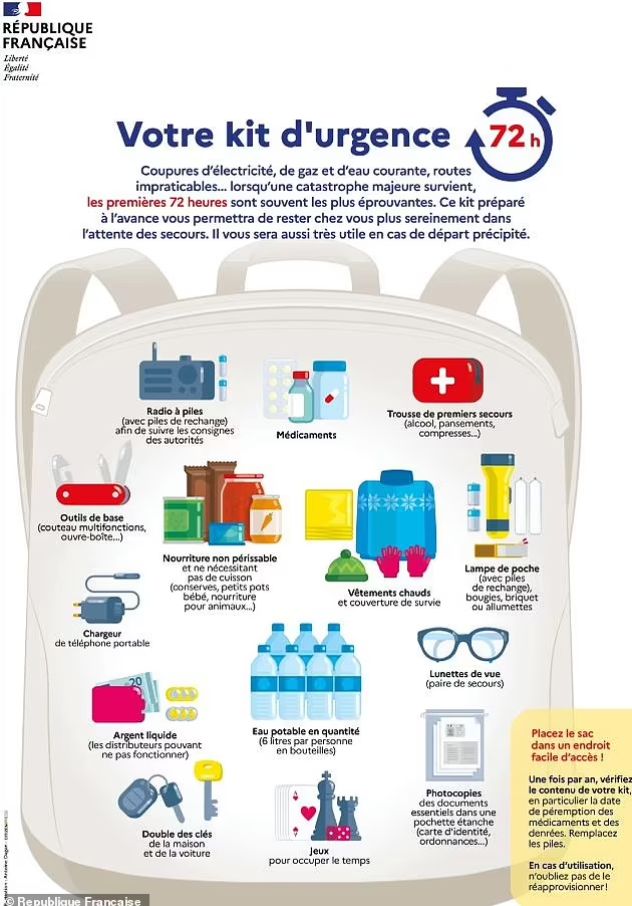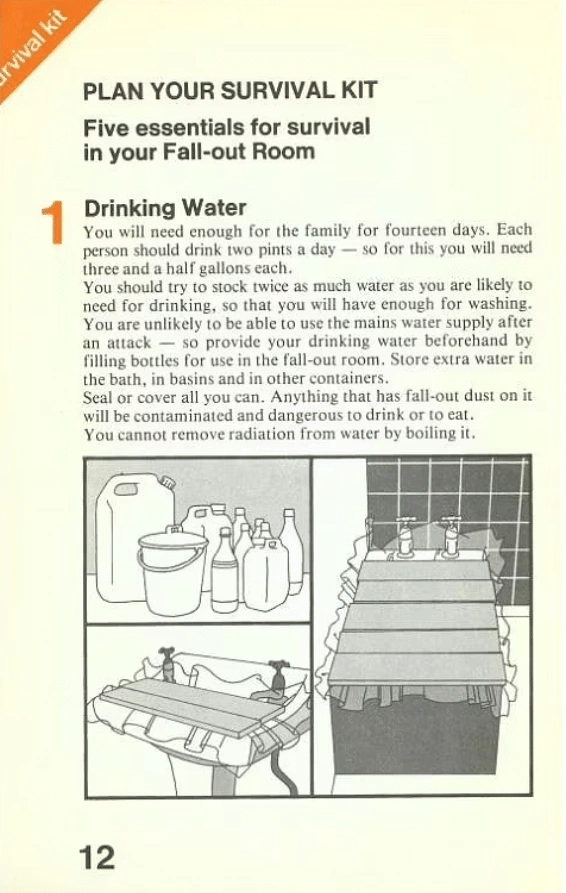France is rolling out a survival guide for its citizens, telling them how to react in case of a big emergency, whether that’s an invasion or some other threat.
The move comes as tensions are rising across Europe, with fears growing about Russia’s aggressive behavior.
The guide is 20 pages long with 63 measures

This guide is about 20 pages long and has 63 different tips on what people should do in emergencies like war, natural disasters, or even a nuclear leak.
It’ll tell people to create a ‘survival kit’ with things like six liters of water, canned food, batteries, a flashlight, and some basic medical stuff like painkillers and bandages.
It includes crucial advice for imminent attacks
The guide will also share advice on how to respond if an attack is about to happen. For example, it’ll suggest joining local defense groups or volunteering for firefighting teams.
One key piece of advice is to ‘lock your doors’ in the event of a nuclear incident – a tip that’s already making some people laugh at how unhelpful it seems.
It’s not just about Russia’s invasion of Ukraine
Even though the guide sounds a bit dramatic, the French government says it’s not just a reaction to Russia’s invasion of Ukraine.
President Emmanuel Macron has said before that Europe needs to be ready for the ‘Russian threat’ and should brace itself for a time when America might not offer as much support.
France’s military build-up is also growing

Macron also recently announced that French fighter jets with hypersonic nuclear missiles will be sent to the German border as part of his effort to strengthen France’s nuclear defense.
Officials who helped create the survival guide, like the General Secretariat for Defence and National Security (SGDSN), say the goal is just “to help people prepare for any crisis that might come their way.”
The booklet’s draft process started in 2022
The idea for the booklet actually goes back to 2022, after the Covid-19 pandemic, when France started thinking about how to get its citizens ready for anything.
But now that it’s almost ready to be sent out, people are raising eyebrows over the timing of the release.
Le Figaro, a French newspaper, pointed out that the guide’s rollout “could easily suggest that the state is reacting to the unstable international situation.”
Macron’s defense budget increase is a key factor
Recently, Macron also pushed for Europe to strengthen its defenses in light of Russia’s actions and America’s uncertain commitment to European security.
He’s doubled France’s defense budget over his two terms in office, and now he’s aiming to increase it to 3-3.5% of the country’s economic output, up from the current 2%.
Bpifrance is investing in French defense projects

In another move to boost defense efforts, France’s public investment bank, Bpifrance, announced a €450 million ($490 million) fund for defense projects.
“French citizens will be able to invest their money in these projects for the long term,” Finance Minister Eric Lombard told TF1.
French defense companies are expected to need over five billion euros in extra capital in the coming years, according to the finance and defense ministries.
Other European countries prepare for future crises

Poland, not wanting to fall behind, is also getting ready. It’s going to send out a survival guide to its citizens, warning them about potential threats, including a possible military attack.
The guide will go out to households this year, and it will include tips on how to deal with things like power outages that could last for days, natural disasters, and more.
People are mocking the French survival guide

French comedian Matthieu Noël couldn’t help but joke about the idea of telling people to “lock their doors” if a nuclear bomb goes off.
“Putin could drop a nuclear bomb on Paris, Ebola could strike the Cantal – we’ll be ready,” he cracked on France Inter. “While you’re at it, why not advise against snorkelling during a tsunami?”
The UK’s lack of preparation guide

While France and others are preparing, the UK isn’t doing much to guide its citizens through a potential crisis. The British government last issued similar advice during the Cold War, but there’s been little movement since then.
A 2004 campaign offered updated advice, but there hasn’t been any major push since.
Other European nations’ initiatives for preparedness

Sweden is a bit ahead in this area. Last year, the country handed out five million copies of a survival booklet called If Crisis or War Comes. It encourages citizens to stock up on food and water and prepare for possible armed conflict.
“An insecure world requires preparedness. The military threat to Sweden has increased, and we must prepare for the worst – an armed attack,” the booklet warns.
Norway has also put out a similar guide, advising citizens to keep medicine, cash, and a week’s worth of non-perishable foods like “crispbreads, canned pulses, beans, sandwich spreads, energy bars, dried fruit, chocolate, biscuits, and nuts.”
Finland, too, has launched a website to help citizens prepare for longer-term crises, including possible military conflict.
Germany’s taking things a step further

Last November, Germany revealed plans to list underground shelters — like train stations and car parks — that could be used to protect people during a war.
The Interior Ministry is planning to repurpose some of these spaces for civilian use in case of an emergency.
Only time will tell if these survival guides are just precautions — or a warning of something bigger on the horizon.

















































